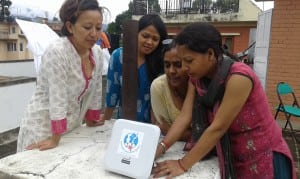[Via Satellite 08-06-2015] Télécoms Sans Frontières, an Inmarsat-supported nongovernmental organization (NGO) providing disaster response and humanitarian support, is continuing to provide post-emergency mHealth support in Nepal roughly three months after the magnitude 7.8 earthquake struck the country, affecting more than 2.8 million people. The charity telecoms agency is working with Médecins du Monde (MdM) to field a mobile data collection system leveraging Inmarsat connectivity to accelerate the detection of disease outbreaks. TSF has equipped MdM medics with a smartphone-based data collection application and supports their daily reporting from remote locations through Inmarsat’s Broadband Global Area Network (BGAN) communications service.
TSF is training mHealth experts on using the system as well has how to send automatically generated health reports with BGAN in the absence of Global System for Mobile communication (GSM) and Code Division Multiple Access (CDMA) networks. Once tutored in the use of the system, teams of medics leave for the Sindulpalchowk region, focusing their operations around 14 of the most affected towns and villages.
According to Inmarsat, the teams average a total of 250 to 500 consultations per day and their outreach covers a population of more than 40,000 beneficiaries. The NGO’s work speeds the detection of epidemics brought on by the arrival of monsoon season.
Following medics’ field interventions, consultation data is automatically transmitted and compiled onto a cloud-based central database. A “one-click” operation then allows the surveillance team in Kathmandu to update their medical tables and charts dashboards. This data proceeds through quantitative analysis using World Health Organization (WHO) standards and thresholds to determine priority areas, concentration of diseases and potential epidemic outbreaks.
The post Télécoms Sans Frontières Continuing mHealth in Nepal appeared first on Via Satellite.
